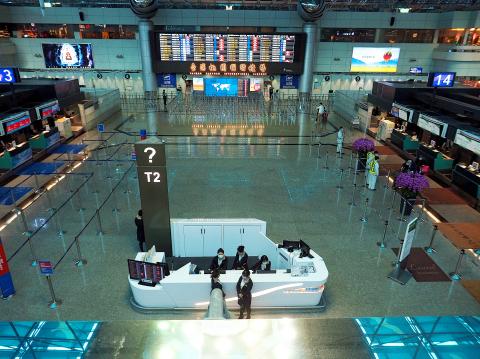Travel agents yesterday urged the Ministry of Transportation and Communications (MOTC) to help resolve their disputes with tourists as more people are canceling their travel plans due to the growing number of COVID-19 infections in other countries.
While China has the highest number of COVID-19 infections, the increasing number of cases in Japan, South Korea, Singapore and Thailand has prompted the Central Epidemic Command Center (CECC) to raise its travel advisory level for those nations.
It raised the travel notice for South Korea to level 3 “warning” — avoid all nonessential travel — on Monday following a spike in confirmed cases there, while the travel advisory for Singapore and Japan is at level 2 “alert” — practice enhanced precautions.

Photo: David Chang / EPA-EFE
The advisory for Thailand is at level 1 “watch,” which urges travelers to take normal precautions.
South East Travel Service Co, one of the nation’s largest travel agencies, said that it stopped organizing package tours to South Korea after the warning was raised on Monday, adding that 70 to 80 percent of its customers who were planning to travel there next month have canceled their tours.
About 60 percent of travelers who were supposed to travel to Japan have also canceled, it said.
Many people who planned to travel to Japan are hesitant about whether they should cancel the tours, as they are concerned that the CECC might raise the alert level, it added.
The cherry blossom season is to begin in Japan in the second half of next month and many Taiwanese would like to take advantage of the long Tomb-Sweeping Holiday weekend in the beginning of April to visit Japan, it added.
Chung Hsing Travel Service Co chairman Ringo Lee (李奇嶽) said that the ministry should bring travel agencies and airlines together to help resolve the disputes caused by tour cancelations.
The nation has about 15 million outbound travelers annually, and about 70 percent of them travel to China, Hong Kong, Macau, Japan and South Korea, he said.
The outbreak could cost the travel industry more than NT$100 billion (US$3.29 billion) in lost revenue in the first half of this year, he said.
Dispute charges caused by tour cancelations prior to departure could exceed NT$10 billion, Lee said, adding that the crux of the problem lies in refunds for cancelations.
“Many consumers think that they would lose 5 percent of the tour fees if the tour is for a level 2 destination and they would get a full refund if it is a level 3 destination. What they do not realize if that if the airlines, shipping firms and hotels do not offer refunds, and charge processing fees, travel agents have to deduct these expenses from the money paid by the consumers. Facing consumers directly, travel agents would inevitably bear the brunt of the blame,” he said.
The Civil Aeronautics Administration said it cannot force airlines to relax their rules on canceling or changing tickets, it can only urge them to consider the idea, Lee said.
While foreign airlines responded positively, Taiwanese airlines still processed ticket charges, he said.
Minister of Transportation and Communications Lin Chia-lung (林佳龍) said that the ministry does not want travel agencies to bear the financial losses and consumers’ complaints alone and it has asked consumer protection officers nationwide to help resolve such disputes.

An undersea cable to Penghu County has been severed, the Ministry of Digital Affairs said today, with a Chinese-funded ship suspected of being responsible. It comes just a month after a Chinese ship was suspected of severing an undersea cable north of Keelung Harbor. The National Communications and Cyber Security Center received a report at 3:03am today from Chunghwa Telecom that the No. 3 cable from Taiwan to Penghu was severed 14.7km off the coast of Tainan, the Ministry of Digital Affairs said. The Coast Guard Administration (CGA) upon receiving a report from Chunghwa Telecom began to monitor the Togolese-flagged Hong Tai (宏泰)

A cat named Mikan (蜜柑) has brought in revenue of more than NT$10 million (US$305,390) for the Kaohsiung MRT last year. Mikan, born on April 4, 2020, was a stray cat before being adopted by personnel of Kaohsiung MRT’s Ciaotou Sugar Refinery Station. Mikan was named after a Japanese term for mandarin orange due to his color and because he looks like an orange when curled up. He was named “station master” of Ciaotou Sugar Refinery Station in September 2020, and has since become famous. With Kaohsiung MRT’s branding, along with the release of a set of cultural and creative products, station master Mikan

RISING TOURISM: A survey showed that tourist visits increased by 35 percent last year, while newly created attractions contributed almost half of the growth Changhua County’s Lukang Old Street (鹿港老街) and its surrounding historical area clinched first place among Taiwan’s most successful tourist attractions last year, while no location in eastern Taiwan achieved a spot in the top 20 list, the Tourism Administration said. The listing was created by the Tourism Administration’s Forward-looking Tourism Policy Research office. Last year, the Lukang Old Street and its surrounding area had 17.3 million visitors, more than the 16 million visitors for the Wenhua Road Night Market (文化路夜市) in Chiayi City and 14.5 million visitors at Tainan’s Anping (安平) historical area, it said. The Taipei 101 skyscraper and its environs —

Taiwan on Friday said a New Zealand hamburger restaurant has apologized for a racist remark to a Taiwanese customer after reports that it had first apologized to China sparked outrage in Taiwan. An image posted on Threads by a Taiwanese who ate at Fergburger in Queenstown showed that their receipt dated Sunday last week included the words “Ching Chang,” a racial slur. The Chinese Consulate-General in Christchurch in a statement on Thursday said it had received and accepted an apology from the restaurant over the incident. The comment triggered an online furor among Taiwanese who saw it as an insult to the